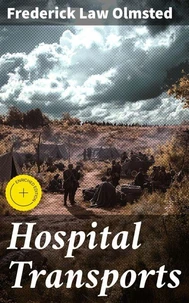Hospital Transports. A memoir of the Embarkation of the Sick and Wounded from the Peninsula of Virginia in the Summer of 1862
Par :Formats :
E-Book
E-Book disponible
Disponible dans votre compte client Decitre ou Furet du Nord dès validation de votre commande. Le format ePub est :
- Compatible avec une lecture sur My Vivlio (smartphone, tablette, ordinateur)
- Compatible avec une lecture sur liseuses Vivlio
- Pour les liseuses autres que Vivlio, vous devez utiliser le logiciel Adobe Digital Edition. Non compatible avec la lecture sur les liseuses Kindle, Remarkable et Sony
 , qui est-ce ?
, qui est-ce ?Notre partenaire de plateforme de lecture numérique où vous retrouverez l'ensemble de vos ebooks gratuitement
Pour en savoir plus sur nos ebooks, consultez notre aide en ligne ici
- Nombre de pages89
- FormatePub
- ISBN859-65--4702420-0
- EAN8596547024200
- Date de parution28/05/2022
- Protection num.Digital Watermarking
- Taille604 Ko
- Infos supplémentairesepub
- ÉditeurDIGICAT
Résumé
In "Hospital Transports, " Frederick Law Olmsted meticulously examines the logistical and emotional complexities of transporting wounded soldiers amidst the chaos of the Civil War. Written in a clear yet poignant prose style, Olmsted's work reflects a profound understanding of both humanitarian concerns and logistical challenges. Through detailed accounts and observations, he critiques contemporary medical practices while advocating for a more compassionate and systematic approach to wartime medical care.
The book serves as a crucial document that not only captures the horrors of war but also highlights the burgeoning field of medical transportation, situated in a stark historical moment where the evolution of public health began to take precedence. Frederick Law Olmsted, renowned as a landscape architect and social critic, was deeply influenced by his experiences observing the effects of war on both the body and psyche of individuals.
His background in agriculture and his commitment to social reform motivated him to delve into the intricacies of medical care during a tumultuous period in American history. Olmsted's unique perspective, drawn from his own encounters with societal needs and the built environment, enriches the narrative and underscores the imperative for humane treatment in the face of adversity. "Hospital Transports" is essential reading for those interested in Civil War history, medical ethics, and the evolution of healthcare practices.
Olmsted's thorough analysis and perceptive insights will resonate with readers, offering a compelling call to action for compassion in medical transportation and broader societal implications. This work not only stands as a historical artifact but also as a timeless reminder of the responsibility we bear for our vulnerable populations.
The book serves as a crucial document that not only captures the horrors of war but also highlights the burgeoning field of medical transportation, situated in a stark historical moment where the evolution of public health began to take precedence. Frederick Law Olmsted, renowned as a landscape architect and social critic, was deeply influenced by his experiences observing the effects of war on both the body and psyche of individuals.
His background in agriculture and his commitment to social reform motivated him to delve into the intricacies of medical care during a tumultuous period in American history. Olmsted's unique perspective, drawn from his own encounters with societal needs and the built environment, enriches the narrative and underscores the imperative for humane treatment in the face of adversity. "Hospital Transports" is essential reading for those interested in Civil War history, medical ethics, and the evolution of healthcare practices.
Olmsted's thorough analysis and perceptive insights will resonate with readers, offering a compelling call to action for compassion in medical transportation and broader societal implications. This work not only stands as a historical artifact but also as a timeless reminder of the responsibility we bear for our vulnerable populations.
In "Hospital Transports, " Frederick Law Olmsted meticulously examines the logistical and emotional complexities of transporting wounded soldiers amidst the chaos of the Civil War. Written in a clear yet poignant prose style, Olmsted's work reflects a profound understanding of both humanitarian concerns and logistical challenges. Through detailed accounts and observations, he critiques contemporary medical practices while advocating for a more compassionate and systematic approach to wartime medical care.
The book serves as a crucial document that not only captures the horrors of war but also highlights the burgeoning field of medical transportation, situated in a stark historical moment where the evolution of public health began to take precedence. Frederick Law Olmsted, renowned as a landscape architect and social critic, was deeply influenced by his experiences observing the effects of war on both the body and psyche of individuals.
His background in agriculture and his commitment to social reform motivated him to delve into the intricacies of medical care during a tumultuous period in American history. Olmsted's unique perspective, drawn from his own encounters with societal needs and the built environment, enriches the narrative and underscores the imperative for humane treatment in the face of adversity. "Hospital Transports" is essential reading for those interested in Civil War history, medical ethics, and the evolution of healthcare practices.
Olmsted's thorough analysis and perceptive insights will resonate with readers, offering a compelling call to action for compassion in medical transportation and broader societal implications. This work not only stands as a historical artifact but also as a timeless reminder of the responsibility we bear for our vulnerable populations.
The book serves as a crucial document that not only captures the horrors of war but also highlights the burgeoning field of medical transportation, situated in a stark historical moment where the evolution of public health began to take precedence. Frederick Law Olmsted, renowned as a landscape architect and social critic, was deeply influenced by his experiences observing the effects of war on both the body and psyche of individuals.
His background in agriculture and his commitment to social reform motivated him to delve into the intricacies of medical care during a tumultuous period in American history. Olmsted's unique perspective, drawn from his own encounters with societal needs and the built environment, enriches the narrative and underscores the imperative for humane treatment in the face of adversity. "Hospital Transports" is essential reading for those interested in Civil War history, medical ethics, and the evolution of healthcare practices.
Olmsted's thorough analysis and perceptive insights will resonate with readers, offering a compelling call to action for compassion in medical transportation and broader societal implications. This work not only stands as a historical artifact but also as a timeless reminder of the responsibility we bear for our vulnerable populations.





